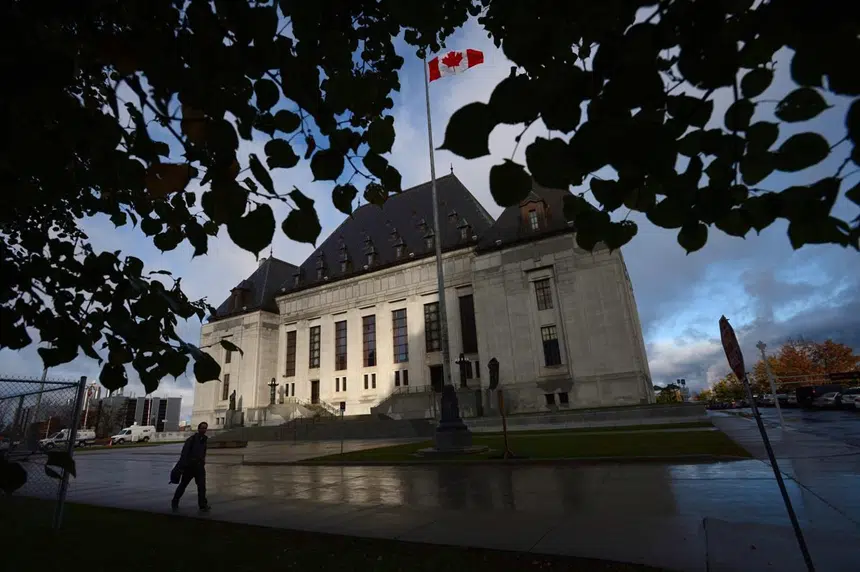Saskatchewan has lost its carbon tax fight.
In a 6-3 decision released early Thursday, the Supreme Court of Canada ruled the federal government has the constitutional power to establish a price for greenhouse gas emissions.
That dashed the hopes of the governments of Saskatchewan, Ontario and Alberta, all of whom were seeking to axe the tax.
“Today’s decision by the Supreme Court of Canada does not change our core conviction that the federal carbon tax is bad environmental policy, bad economic policy, and simply wrong,” Saskatchewan Premier Scott Moe said in a statement.
”While the Supreme Court has determined that Prime Minister (Justin) Trudeau has the legal right to impose a carbon tax, it doesn’t mean he should, and it doesn’t make the carbon tax any less punitive for Saskatchewan people.
Last May, Moe’s government challenged the constitutionality of the tax in the Saskatchewan Court of Appeal. The court dismissed the challenge in a 3-2 ruling.
The split decision prompted the government to take the case to the Supreme Court of Canada.
After Thursday’s decision was announced, Moe said the Saskatchewan government would “remain vigilant in defending our constitutional jurisdiction from further infringement from this federal government.”
“Our government will continue to make every effort to protect Saskatchewan families, workers and businesses from the negative consequences of the federal carbon tax,” said Moe, who is to speak about the decision at noon Thursday.
“Later today, I will outline measures that Saskatchewan will take in the months ahead to protect Saskatchewan people while addressing climate change. We will forge our own path without being subject to the punitive and ineffective carbon tax imposed by Prime Minister Trudeau and the federal government.”
In a statement, Saskatchewan NDP Leader Ryan Meili said the carbon tax will continue to have a significant impact on people in the province’s rural and remote areas.
As a result, Meili called on the Moe government to work with the federal government and “negotiate a better deal that protects Saskatchewan’s economy and gives working families a break.”
To that end, the NDP urged the provincial government to fight for tax exemptions on fuel used for grain drying and rebates that will help families get more back than they pay in the tax.
Meili also noted the Trudeau government has to invest in Saskatchewan’s biofuels, geothermal, solar and wind industries.
“The federal government must press pause on its plans to dramatically increase the carbon tax, especially while so many families across the country — not just in Saskatchewan — are struggling coming through the pandemic,” Meili wrote. “Now is not the time to increase costs on working families.”
The carbon tax, known legally as the Greenhouse Gas Pollution Pricing Act, was passed by the federal government in 2018. It sets a minimum price on carbon emissions and imposes a federal pricing system in provinces that don’t meet that price with a system of their own.
Ontario’s appeals court also upheld the law as a matter of national concern, but Alberta’s top court struck it down in 2020 for interfering with a province’s constitutional right to develop its natural resources.
In Thursday’s written decision, Chief Justice Richard Wagner said climate change is a real danger and evidence shows a price on pollution is a critical element in addressing it.
“It is a threat of the highest order to the country, and indeed to the world,” Wagner wrote.
Given that, said Wagner, Canada’s evidence that this is a matter of national concern is sound.
“The undisputed existence of a threat to the future of humanity cannot be ignored,” he wrote.
The onus was on the federal government to prove to the court this is an issue of national concern that would allow it to take control of the matter rather than leaving it to the provinces. The majority of the court found the federal government did that, noting all parties, including the provinces challenging the law, agreed climate change is “an existential challenge.”
Wagner also wrote provinces can’t set minimum national standards on their own and if even one province fails to reduce its emissions, that could have an inordinate impact on other provinces.
He noted the three provinces that challenged the ruling also withdrew from the Pan-Canadian Framework on Clean Growth and Climate Change. That agreement, signed in 2016, agreed to set a national carbon price.
“When provinces that are collectively responsible for more than two-thirds of Canada’s total GHG emissions opt out of a co-operative scheme, this illustrates the stark limitations of a non-binding cooperative approach,” he wrote.
That left the remaining provinces, responsible for only one-third of Canada’s total emissions, “vulnerable to the consequences of the lion’s share of the emissions being generated by the non-participating provinces.”
Justice Suzanne Cote dissented in part, agreeing climate change is an issue of national concern but taking issue with the power the federal cabinet gave itself to adjust the law’s scope, including which fuels the price would apply to.
Justices Malcolm Rowe and Russell Brown dissented with the entire decision, arguing Canada had not shown climate change reaches the level of national concern. They objected the precedent the majority’s decision sets would allow Ottawa to set minimum national standards in all areas of provincial jurisdiction.
— With files from The Canadian Press











